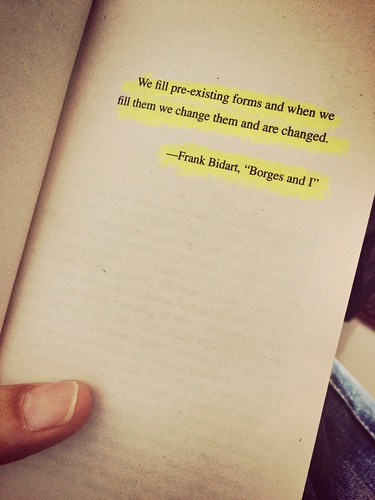35: What is the purpose of writing? #LifeWideLearning16 @MrChase
— Ben Wilkoff (@bhwilkoff) February 4, 2016
When I was in university and going through some things, I wrote poetry. Not the poetry you’re thinking of – stream of consciousness poetry. Pages full of word after word poetry. My professor, to her credit, saw that those words and how they poured out of me were about more than whatever assignments she’d been giving. Whatever grades I earned in that class, they were about my ability to analyze the works of others and certainly nothing to do with what I’d created.
Whenever I’ve been in love, I’ve written poetry to the object of my affection. Hours have been spent agonizing over stanzas, couplets, and figurative language. In a few instances, those relationships inspired poetry from others. I got to come to an understanding of what I meant to another person in verse.
Throughout high school, I wrote a regular column for the local paper’s youth section. Some pieces were ridiculous attempts to replicate the humor I’d found in the columns of adult voices. Others worked to build a bridge between my high school experience and that of other students and adults who were reading. The ones I loved most started with a mindset of, “What if I try this?” Having that space and that audience made a huge difference in my sense of identity in high school.
I don’t remember much about college, but I remember working at the paper. I remember starting out as a reporter and scrapping for stories. I remember writing my first column and taking that job as seriously as I’d taken anything. I remember becoming editor-in-chief and feeling the responsibility of informing a campus. I remember telling my editors and reporters, “If every student on this campus can’t see themselves somewhere in each issue, then we’re not doing our job.” Different than my high school writing, this was writing with a responsibility I’d never felt before.
Now, my day gig gives me the opportunity to work with practitioners and experts from across the country to form guidance and material that pushes people to shift their thinking about how they form systems and processes of learning. I am asked on a regular basis to provide content that will inform policy and messaging at levels I’d never imagined being a part of. Getting things right has only mattered this much once before.
Writing project descriptions as a teacher was the most difficult writing I’ve ever done. Several years in, the biggest learning I did was asking students who’d had my classes before to read my plans and tell me where I’d screwed up. That writing wasn’t just to explain a thing to other people, but to help them move toward experiences that built on their understanding of the world. Getting things wrong meant they didn’t get to where I knew they could. Getting things right meant they completed projects beyond my imagining. I was writing for the approval of my students and their advancement. What could matter more?
I think you mean, “What are the purposes of writing?” No teacher could have anticipated the things that lead me to write so far in life, and I’ve learned I shouldn’t assume to know what will inspire me to put words to screen or page down the road.
What is the purpose of writing? All of them.
This post is part of a daily conversation between Ben Wilkoff and me. Each day Ben and I post a question to each other and then respond to one another. You can follow the questions and respond via Twitter at #LifeWideLearning16.
